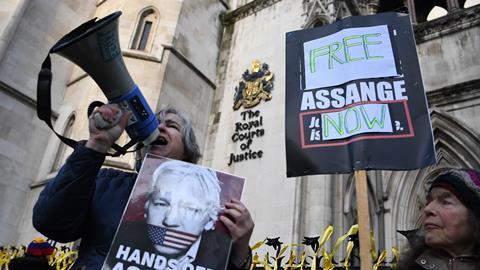Julian Assange can be extradited to the United States over WikiLeaks’ publication of leaked military documents a decade ago, the High Court ruled today.
Assange, 50, is wanted on 18 counts connected with obtaining and publishing defence and national security information relating to the US wars in Afghanistan and Iraq.
He has been held in the high-security HMP Belmarsh in south east London since 2019 after he was arrested and removed from the Ecuadorian embassy, where he had stayed since 2012.
In January, district judge Vanessa Baraitser ruled that Assange should not be sent to the US as his mental health was ‘such that it would be oppressive to extradite him’.
The US appealed against the ruling at a hearing in October, arguing that assurances given to the UK government after the district judge’s ruling about the conditions in which Assange would be held dealt with her concerns.
Announcing the court’s decision, Lord Justice Holroyde – who sat with the lord chief justice, Lord Burnett – said the assurances, which he described as ‘solemn undertakings offered by one government to another’, were ‘sufficient to meet the concerns which led to the district judge’s decision’.
The judge said the US has ‘excluded the possibility of Mr Assange being made subject to special administrative measures or held at the ADX Florence Supermax jail’ in Colorado, agreed to consent to his transfer to Australia to serve his sentence if he was convicted and that Assange would receive ‘appropriate clinical and psychological treatment’.
Holroyde said Baraitser, having decided to discharge Assange, ‘ought to have notified the USA of her provisional view, to afford it the opportunity to offer assurances to the court’.
He concluded that the case ‘must be remitted to Westminster Magistrates’ Court with a direction that a district judge send the case to the Secretary of State, who will decide whether Mr Assange should be extradited to the USA’.
Holroyde also said that Assange ‘has indicated that he challenges the district judge’s decisions on the issues which were decided against him, and will seek to raise those issues at a later stage’.




























11 Readers' comments